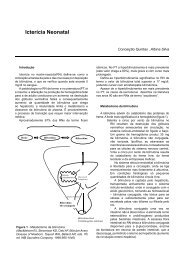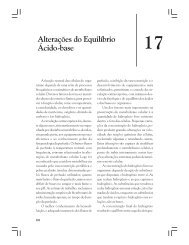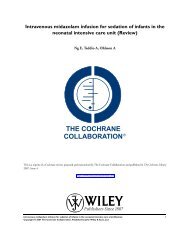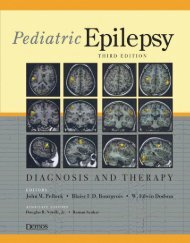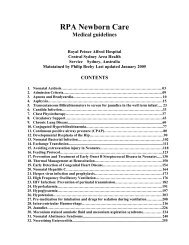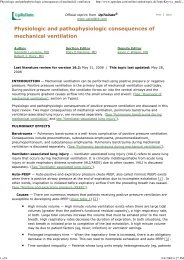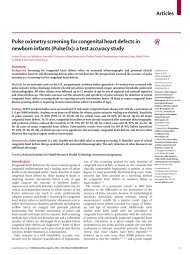- Page 1 and 2:
e.medecine NEONATOLOGY 2006
- Page 3 and 4:
24. Neonatal Hypertension..........
- Page 5 and 6:
Although EPO is not the only erythr
- Page 7 and 8:
Causes: • AOP results from a comb
- Page 9 and 10:
• Reducing the number of donor ex
- Page 11 and 12:
FOLLOW-UP Section 8 of 10 Further O
- Page 13 and 14:
Apnea of Prematurity Last Updated:
- Page 15 and 16:
The primary problem for premature n
- Page 17 and 18:
pressure. Bradycardia may begin wit
- Page 19 and 20:
TREATMENT Section 6 of 11 Medical C
- Page 21 and 22:
Drug Name Doxapram (Dopram) -- Stim
- Page 23 and 24:
Prognosis: • The natural history
- Page 25 and 26:
o Despite the number of premature i
- Page 27 and 28:
BIBLIOGRAPHY Section 11 of 11 • B
- Page 29 and 30:
Tidal volume is the volume of gas i
- Page 31 and 32:
5 time constants. The resulting tim
- Page 33 and 34:
Once the diagnosis of RDS is establ
- Page 35 and 36:
PATHOPHYSIOLOGY-BASED VENTILATORY S
- Page 37 and 38:
High-frequency ventilation:High-fre
- Page 39 and 40:
Picture 2. Determinants of oxygenat
- Page 41 and 42:
Birth Trauma Last Updated: August 4
- Page 43 and 44:
The extent of hemorrhage may be sev
- Page 45 and 46:
CRANIAL NERVE AND SPINAL CORD INJUR
- Page 47 and 48:
unpredictable unavoidable complicat
- Page 49 and 50:
Bowel Obstruction in the Newborn La
- Page 51 and 52:
The prenatal diagnosis of a bowel o
- Page 53 and 54:
demonstrate the normal fixation pat
- Page 55 and 56:
Other causes of proximal bowel obst
- Page 57 and 58:
Hirschsprung disease Hirschsprung d
- Page 59 and 60:
POSTOPERATIVE CARE FOLLOWING SURGER
- Page 61 and 62:
Picture 4. Bowel obstruction in the
- Page 63 and 64:
Breast Milk Jaundice Last Updated:
- Page 65 and 66:
DIFFERENTIALS Section 4 of 9 Anemia
- Page 67 and 68:
Consultations: Diet: • Consider c
- Page 69 and 70:
Bronchopulmonary Dysplasia Last Upd
- Page 71 and 72:
CLINICAL Section 3 of 11 History: B
- Page 73 and 74:
of BPD and in the need for continue
- Page 75 and 76:
Physical: • Infants with BPD have
- Page 77 and 78:
discomfort. Many new synchronized v
- Page 79 and 80:
treat acute bronchospasm; however,
- Page 81 and 82:
• Excessive glucose loads may inc
- Page 83 and 84:
Interactions Beta-adrenergic blocke
- Page 85 and 86:
Drug Category: Pulmonary vasodilato
- Page 87 and 88:
MISCELLANEOUS Section 9 of 11 Medic
- Page 89 and 90:
• Frank L, Groseclose E: Oxygen t
- Page 91 and 92:
• Northway WH Jr: Bronchopulmonar
- Page 93 and 94:
Congenital Diaphragmatic Hernia Las
- Page 95 and 96:
DIFFERENTIALS Section 4 of 10 Aspir
- Page 97 and 98:
o Inhaled nitric oxide may be used
- Page 99 and 100:
Drug Name Pediatric Dose Contraindi
- Page 101 and 102:
Drug Name Pediatric Dose Vecuronium
- Page 103 and 104:
Prognosis: • Pulmonary recovery:
- Page 105 and 106:
• O'Toole SJ, Irish MS, Holm BA:
- Page 107 and 108:
This article reviews the mechanics
- Page 109 and 110:
Positioning the infant Positioning
- Page 111 and 112:
stress and fatigue in both parents
- Page 113 and 114:
As the mother's milk supply is esta
- Page 115 and 116:
Engorgement Engorgement is a common
- Page 117 and 118:
Ethical Issues in Neonatal Care Las
- Page 119 and 120:
GOALS OF NEONATAL INTENSIVE CARE Se
- Page 121 and 122:
Other guidelines of ethical import
- Page 123 and 124:
In some situations, tragic situatio
- Page 125 and 126:
BIBLIOGRAPHY Section 8 of 8 • AAP
- Page 127 and 128:
CLINICAL FEATURES Section 4 of 7 Th
- Page 129 and 130:
Comparisons of the nutrient content
- Page 131 and 132:
Indomethacin is used prophylactical
- Page 133 and 134:
FOLLOW-UP CARE Section 5 of 7 Nearl
- Page 135 and 136:
BIBLIOGRAPHY Section 7 of 7 • Bha
- Page 137 and 138:
Fluid, Electrolyte, and Nutrition M
- Page 139 and 140:
Clinical evaluation • Weight fact
- Page 141 and 142:
o Hypernatremia is defined as a ser
- Page 143 and 144:
intake from protein is included in
- Page 145 and 146:
Energy ENTERAL NUTRITION MANAGEMENT
- Page 147 and 148:
growth and bone mineral content has
- Page 149 and 150:
Hemolytic Disease of Newborn Last U
- Page 151 and 152:
CLINICAL Section 3 of 11 History: W
- Page 153 and 154:
• Serologic tests Imaging Studies
- Page 155 and 156:
IVT in 1981. With ultrasonographic
- Page 157 and 158:
status (eg, watching for hypoglycem
- Page 159 and 160:
� The mechanism by which unconjug
- Page 161 and 162:
BIBLIOGRAPHY Section 11 of 11 • B
- Page 163 and 164:
Race: No racial predilection exists
- Page 165 and 166:
Drug Name Pediatric Dose Phytonadio
- Page 167 and 168:
Human Milk and Lactation Last Updat
- Page 169 and 170:
LACTATION Section 5 of 11 Two essen
- Page 171 and 172:
IMMUNOLOGIC PROPERTIES OF HUMAN MIL
- Page 173 and 174:
Picture 3. Human milk and lactation
- Page 175 and 176:
• Isaacs CE, Thormar H: The role
- Page 177 and 178:
Hydrops Fetalis Last Updated: June
- Page 179 and 180:
Also of note is a computer simulati
- Page 181 and 182:
Physical: The presence of any of th
- Page 183 and 184:
o Once disorders of hemoglobin alph
- Page 185 and 186:
Structural anomalies Table 2. Cardi
- Page 187 and 188:
o B19V o Cytomegalovirus (CMV) o Sy
- Page 189 and 190:
o Sjögren syndrome A (uncertain in
- Page 191 and 192:
most commonly thrombocytopenia, is
- Page 193 and 194:
Lab Studies: WORKUP Section 5 of 10
- Page 195 and 196:
o Karyotyping is always indicated i
- Page 197 and 198:
TREATMENT Section 6 of 10 Medical C
- Page 199 and 200:
• Space-occupying masses, which i
- Page 201 and 202:
of antidiabetic agents and antagoni
- Page 203 and 204:
Drug Name Sotalol (Betapace) -- Rec
- Page 205 and 206:
• Cowan RH, Waldo AL, Harris HB:
- Page 207 and 208:
• Silverman NH, Schmidt KG: Ventr
- Page 209 and 210:
At the cellular level, neuronal inj
- Page 211 and 212:
o Disturbances of ocular motion, su
- Page 213 and 214:
DIFFERENTIALS Section 4 of 10 Methy
- Page 215 and 216:
TREATMENT Section 6 of 10 Medical C
- Page 217 and 218:
Interactions Benzodiazepines, cimet
- Page 219 and 220:
o Allopurinol: Slight improvements
- Page 221 and 222:
• Patel J, Edwards AD: Prediction
- Page 223 and 224:
Increased insulin levels stimulate
- Page 225 and 226:
irth; symptoms may include jitterin
- Page 227 and 228:
speculated to be secondary to incre
- Page 229 and 230:
Procedures: o Clinical features of
- Page 231 and 232:
• Cardiac management o If signs o
- Page 233 and 234:
Pediatric Dose Contraindications In
- Page 235 and 236:
FOLLOW-UP Section 8 of 10 Further O
- Page 237 and 238:
MISCELLANEOUS Section 9 of 11 Medic
- Page 239 and 240:
limiting step in the process, relea
- Page 241 and 242:
History: CLINICAL Section 3 of 11
- Page 243 and 244:
Lab Studies: WORKUP Section 5 of 11
- Page 245 and 246:
at equilibrium conditions, the isom
- Page 247 and 248:
• A number of guidelines for the
- Page 249 and 250:
Exchange transfusion Exchange trans
- Page 251 and 252:
FOLLOW-UP Section 8 of 11 Further I
- Page 253 and 254:
BIBLIOGRAPHY Section 11 of 11 • A
- Page 255 and 256:
Kernicterus Last Updated: November
- Page 257 and 258:
CLINICAL Section 3 of 11 History: A
- Page 259 and 260:
o Extravasated blood: Significant a
- Page 261 and 262:
milk intake because of reduced mamm
- Page 263 and 264:
department and must be heavily seda
- Page 265 and 266:
Diet: Depending on the degree of ne
- Page 267 and 268:
Transfer: The recently reported cas
- Page 269 and 270:
Prognosis: The spectrum of neurolog
- Page 271 and 272:
Picture 5. Kernicterus. Neuronal ch
- Page 273 and 274:
Airway obstruction Complete obstruc
- Page 275 and 276:
Lab Studies: WORKUP Section 5 of 11
- Page 277 and 278:
MEDICATION Section 7 of 11 In addit
- Page 279 and 280:
Drug Category: Sedatives -- Maximiz
- Page 281 and 282:
Transfer: • Although stabilizatio
- Page 283 and 284:
BIBLIOGRAPHY Section 11 of 11 • A
- Page 285 and 286:
occurs even later (ie, during days
- Page 287 and 288:
• Delivery room management of inf
- Page 289 and 290:
MISCELLANEOUS Section 7 of 9 Medica
- Page 291 and 292:
Necrotizing Enterocolitis Last Upda
- Page 293 and 294:
Race: Some studies indicate higher
- Page 295 and 296:
Lab Studies: WORKUP Section 5 of 10
- Page 297 and 298:
o With abdominal ultrasonography, a
- Page 299 and 300:
o Stage IB � Diagnosis is the sam
- Page 301 and 302:
Pregnancy C - Safety for use during
- Page 303 and 304:
Drug Name Epinephrine (Adrenaline)
- Page 305 and 306:
Pediatric Dose Contraindications In
- Page 307 and 308:
• Short-gut syndrome o This is a
- Page 309 and 310:
Picture 5. Necrotizing enterocoliti
- Page 311 and 312:
Neonatal Hypertension Last Updated:
- Page 313 and 314:
o Although BP readings obtained usi
- Page 315 and 316:
Other Problems to be Considered: Re
- Page 317 and 318:
as nitroprusside, that may make it
- Page 319 and 320:
Surgical Care: Surgery is rarely in
- Page 321 and 322:
decrease in cardiac output; triazol
- Page 323 and 324:
Contraindications Documented hypers
- Page 325 and 326:
FOLLOW-UP Section 8 of 10 Further I
- Page 327 and 328:
• Flynn JT: Neonatal hypertension
- Page 329 and 330:
Neonatal Resuscitation Last Updated
- Page 331 and 332:
Fetal pulmonary physiology The feta
- Page 333 and 334:
Flow studies have revealed that rel
- Page 335 and 336:
Table 2. Equipment for Neonatal Res
- Page 337 and 338:
Airway management Once the infant i
- Page 339 and 340:
Cardiovascular support and chest co
- Page 341 and 342:
Once the appropriate functional res
- Page 343 and 344:
Premature infants are also at high
- Page 345 and 346:
Because secretions or oral feedings
- Page 347 and 348:
The team should be led and organize
- Page 349 and 350:
Intubation and suctioning for mecon
- Page 351 and 352:
Neonatal Sepsis Last Updated: June
- Page 353 and 354:
The fetus has some preimmune immuno
- Page 355 and 356:
when chorioamnionitis accompanies t
- Page 357 and 358:
weeks of infection, the proportion
- Page 359 and 360:
cultures, clinicians may elect to c
- Page 361 and 362:
o The clinician may require differe
- Page 363 and 364:
Precautions Drug Name Pediatric Dos
- Page 365 and 366:
Pregnancy B - Usually safe but bene
- Page 367 and 368:
MISCELLANEOUS Section 9 of 11 Medic
- Page 369 and 370:
Neural Tube Defects in the Neonatal
- Page 371 and 372:
An experienced pediatrician or surg
- Page 373 and 374:
EPIDEMIOLOGY Section 3 of 11 Severa
- Page 375 and 376:
ETIOLOGY Section 5 of 11 Over the l
- Page 377 and 378:
AFP concentration in the maternal s
- Page 379 and 380:
separated his patients into 3 diffe
- Page 381 and 382:
Head ultrasound can be performed du
- Page 383 and 384:
OUTCOME AND PROGNOSIS OF CHILDREN W
- Page 385 and 386:
Picture 2. Neural tube defects in t
- Page 387 and 388:
Picture 8. Neural tube defects in t
- Page 389 and 390:
• Sutton LN, Adzick NS, Bilaniuk
- Page 391 and 392:
Pathophysiology: • The umbilical
- Page 393 and 394:
• Omphalitis also may be the init
- Page 395 and 396:
• Supportive care: In addition to
- Page 397 and 398:
Drug Name Clindamycin (Cleocin) --
- Page 399 and 400:
multiple organisms) that lead direc
- Page 401 and 402:
• McKenna H, Johnson D: Bacteria
- Page 403 and 404:
Several processes combine to form t
- Page 405 and 406:
Frequency: • In the US: Combined
- Page 407 and 408:
• Polyhydramnios suggests fetal i
- Page 409 and 410:
aby with a giant omphalocele or in
- Page 411 and 412:
Prognosis: without extensively unde
- Page 413 and 414:
Picture 3. Omphalocele and gastrosc
- Page 415 and 416:
Picture 11. Omphalocele and gastros
- Page 417 and 418:
Picture 20.Omphalocele and gastrosc
- Page 419 and 420:
Perinatal Drug Abuse and Neonatal D
- Page 421 and 422:
Race: • The difficulty in assessi
- Page 423 and 424:
ehavioral and cognitive changes. Ma
- Page 425 and 426:
• All medically treated newborns
- Page 427 and 428:
Drug Category: Barbiturates -- Alth
- Page 429 and 430:
• Cognitive and developmental def
- Page 431 and 432:
Perioperative Pain Management in Ne
- Page 433 and 434:
The relative potency of each volati
- Page 435 and 436:
Opioid administration remains the m
- Page 437 and 438:
Use a short beveled needle to minim
- Page 439 and 440:
• Lerman J, Robinson S, Willis MM
- Page 441 and 442:
Pathophysiology: Site of origin The
- Page 443 and 444:
Pathogenesis of sequelae The major
- Page 445 and 446:
• Hypertension or beat-to-beat va
- Page 447 and 448:
Interactions suspected necrotizing
- Page 449 and 450:
PICTURES Section 10 of 11 Picture 1
- Page 451 and 452:
Picture 8. Periventricular hemorrha
- Page 453 and 454:
• Roberts JR: Drug therapy in inf
- Page 455 and 456:
Following the initial insult, wheth
- Page 457 and 458:
FOLLOW-UP Section 7 of 10 Further O
- Page 459 and 460:
Picture 6. Cranial CT scan, axial i
- Page 461 and 462: Polycythemia of the Newborn Last Up
- Page 463 and 464: Causes: • Increased fetal erythro
- Page 465 and 466: FOLLOW-UP Section 7 of 9 Further In
- Page 467 and 468: Polyhydramnios and Oligohydramnios
- Page 469 and 470: Causes: umbilical artery, gastroint
- Page 471 and 472: TREATMENT Section 5 of 9 Medical Ca
- Page 473 and 474: Prognosis: • Polyhydramnios o If
- Page 475 and 476: Pulmonary Interstitial Emphysema La
- Page 477 and 478: compared to 39 of 169 among infants
- Page 479 and 480: • Selective main bronchial intuba
- Page 481 and 482: • Other considerations o Avoid us
- Page 483 and 484: • Gaylord MS, Quissell BJ, Lair M
- Page 485 and 486: The components of pulmonary surfact
- Page 487 and 488: WORKUP Section 5 of 11 Lab Studies:
- Page 489 and 490: in infants who respond poorly or ar
- Page 491 and 492: intensive care setting, and be anxi
- Page 493 and 494: Table 6. Meta-Analysis of Clinical
- Page 495 and 496: Drug Name Pediatric Dose of acute a
- Page 497 and 498: The postnatal use of surfactant the
- Page 499 and 500: Picture 5. A schematic diagram of t
- Page 501 and 502: Retinopathy of Prematurity Last Upd
- Page 503 and 504: • Examination recommendations Oth
- Page 505 and 506: FOLLOW-UP Section 7 of 10 Further I
- Page 507 and 508: Picture 5. Retinopathy of prematuri
- Page 509 and 510: • Raju TN, Langenberg P, Bhutani
- Page 511: • Contractility is a semiquantita
- Page 515 and 516: mL/kg of volume expansion should re
- Page 517 and 518: MEDICATION Section 7 of 10 Drug Cat
- Page 519 and 520: Drug Name cyanide toxicity; sodium
- Page 521 and 522: Pregnancy Precautions Drug Name fur
- Page 523 and 524: Transient Tachypnea of the Newborn
- Page 525 and 526: DIFFERENTIALS Section 4 of 11 Pneum
- Page 527 and 528: Drug Name Pediatric Dose Gentamicin
- Page 529 and 530: Transport of the Critically Ill New
- Page 531 and 532: Communications To initiate the tran
- Page 533 and 534: Table 1. Advantages and disadvantag
- Page 535 and 536: Table 2. A comparison of the advant
- Page 537 and 538: Flight team personnel also are affe
- Page 539 and 540: PICTURES Section 10 of 11 Picture 1



